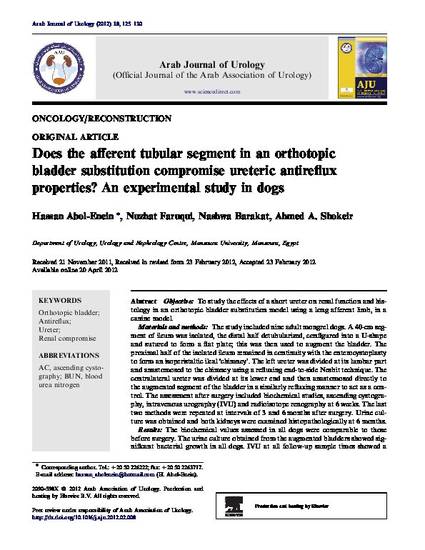
Objective: To study the effects of a short ureter on renal function and histology in an orthotopic bladder substitution model using a long afferent limb, in a canine model.
Materials and methods: The study included nine adult mongrel dogs. A 40-cm segment of ileum was isolated, the distal half detubularized, configured into a U-shape and sutured to form a flat plate; this was then used to augment the bladder. The proximal half of the isolated ileum remained in continuity with the enterocystoplasty to form an isoperistaltic ileal ‘chimney’. The left ureter was divided at its lumbar part and anastomosed to the chimney using a refluxing end-to-side Nesbit technique. The contralateral ureter was divided at its lower end and then anastomosed directly to the augmented segment of the bladder in a similarly refluxing manner to act as a control. The assessment after surgery included biochemical studies, ascending cystography, intravenous urography (IVU) and radioisotope renography at 6 weeks. The last two methods were repeated at intervals of 3 and 6 months after surgery. Urine culture was obtained and both kidneys were examined histopathologically at 6 months.
Results: The biochemical values assessed in all dogs were comparable to those before surgery. The urine culture obtained from the augmented bladders showed significant bacterial growth in all dogs. IVU at all follow-up sample times showed a normal configuration of both kidneys. Ascending cystography showed reflux in four of nine dogs on the right and six on the left side. There was a progressive decrease in the mean selective renographic clearance values of each of the right and left kidneys at intervals of 6 weeks, 3 and 6 months. The mean percentage reduction of renographic clearance was significantly higher in the left kidneys at 6 weeks and 3 months. Histopathological examination showed evidence of interstitial nephritis in all nine dogs and pyelonephritis in four of the left kidneys, while none of the right kidneys showed evidence of inflammation. Conclusion: Adequate peristalsis in a healthy long ureter is superior to the ileal segment substitution for protecting the kidney tissue against inflammation in the absence of an anatomical antireflux mechanism.
Available at: http://works.bepress.com/nuzhat_faruqui/12/

This work was published before the author joined Aga Khan University.